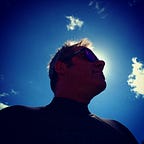In the dark blue of a February evening I’m watching four lunatics surf in the gloaming. Hooded phantoms slipping in and out of view behind the huge sets of breakers that are pummelling Trevaunance Cove. There aren’t many out, but those that are aren’t rushing back. It might be a filthy night but for them it’s too good to miss.
I’m leaning on the railings of the Jubilee garden and I wouldn’t be surprised to find barnacles on the seaward side. I’m a hundred yards back and above the beach, but the sea is all around. It’s inside and out, in my ears and nose, and I can taste it on my lips. It’s not really raining but the air is saturated and the wind is flecking the wet sheen of the road down to the slipway. The pint of Tribute I’ve smuggled out of the pub now has a saline flavour, and there’s probably a bit of sand in it too. It’s delicious.
In the function room of the Driftwood Spars there’s an RNLI fundraiser in full swing. There’s a band playing shanties and there are boozy harmonies and the cackle and chuckle of easy laughter between friends echoing out onto the street. I’d been welcomed and given a friendly interrogation by the two pensioners at the bar. ‘What are you doing here?’ in the most amicable terms. Curious not hostile. At this time of year it would be business more likely than pleasure. I thought I could have passed for a local, but of course the locals all know each other, and a Finisterre coat is a signal perhaps, but not effective camouflage down here anymore.
It’s not even six o’clock but the village is dark. I can count four houses on the opposite side of St Agnes that have their lights on. Maybe two on this side.
No one is home.
No one is second home.
I’d love this to be my first home, or my main home or just the place I call home. But family ties and responsibilities and, frankly, money, mean that it can’t be for quite a while. But I do feel at home here. Deeply connected to something intangible and inexplicable.
Like a lot of people who are drawn west every year, its magic holds me spellbound and warm even when the gales rip off the Atlantic and the mizzle sets in. It’s partly happy memories of sunbaked childhood holidays, and partly because I get to work with vibrant and thriving young companies, but it’s mostly the freedom of being physically closer to the edge.
Our proximity to any kind of power shapes and defines us. Wild weather erodes with a relentless force, and if it can reduce boulders to sand, it will surely reshape us too. Stagnant ponds don’t make smooth pebbles. You don’t have to be at the literal point where the land ends to feel that kind of metaphysical metamorphosis, but it’s why so many of us are drawn to the peaks and pikes and beacons and wild fringes of the country. Our kind feels most alive the closer we are to the wilderness; something much bigger and far more feral than you. You just don’t feel that in Hampshire and Surrey.
There’s a bigger story about how and why we migrate around the world and how the young are always lured away to the city, and how they’re replaced by the wealthier and older and more demanding city folk. Twas ever thus, and so these are all places that don’t take kindly to those who just take, and they don’t like outsiders’ impositions, because they’ve felt the burden and loss of both in their communities. Changes to the communities that never feel like progress.
For a couple of years I lived on a tiny island in the South Pacific. No, it’s not what you’re picturing. There were no coconuts. It was all wind-strafed pines and storm-battered cliffs and three perfect coves of golden sand that shone in the summer and ripped in the winter. It had a mutinous pirate history, ancient traditions unconnected with anywhere else, and a unique language that was dying with the elders. The people were sea people because all islanders are.
I asked an Australian man who’d lived there for over a decade, how one became an Islander?
“The same way a cat becomes a dog.” He shot back instantly.
He paused for a while.
“You can live with them, marry one of them, it might even become your home, but you’ll never be an islander.”
He let three beats pass then added, “But if you want to be part of the community, and love the place the way they love it, and bring something of yourself to it, then you’ll find nowhere better. If you can find that part of you that you’d willingly give to this place, well then the welcome here is more real than anywhere I’ve ever been. You might even become one of them. After a decade or two.”
It turned out that I didn’t need to become an Islander for the Island to become my home. I just needed to let it smooth my sharp edges into a shape that would fit. But it wasn’t a passive one way thing. I got involved in things that I hoped would put back something to repay the debt of how much I was given. Allowing myself to be reshaped by a place and its people.
So maybe that’s where home is. A place that can literally and figuratively reshape you. The place where you gladly give far more of yourself than you take in return. If you find the place where you want to do that then it’ll repay you far more generously than anything you could ever buy or just take. I think that’s why I’m always going to be drawn west. Hopefully, one day, for good.
[original written for, and published in, The Southwester Newspaper]
